Ociperlimab is a monoclonal antibody commercialized by BeiGene, with a leading Phase III program in Squamous Non-Small Cell Lung Cancer. According to Globaldata, it is involved in 13 clinical trials, of which 7 were completed, 4 are ongoing, 1 is planned, and 1 was terminated. GlobalData uses proprietary data and analytics to provide a complete picture of Ociperlimab’s valuation in its risk-adjusted NPV model (rNPV). Buy the model here.

Discover B2B Marketing That Performs
Combine business intelligence and editorial excellence to reach engaged professionals across 36 leading media platforms.
The revenue for Ociperlimab is expected to reach an annual total of $59 mn by 2038 globally based off GlobalData’s Expiry Model. The drug’s revenue forecasts along with estimated costs are used to measure the value of an investment opportunity in that drug, otherwise known as net present value (NPV). Applying the drug’s phase transition success rate to remaining R&D costs and likelihood of approval (LoA) to sales related costs provides a risk-adjusted NPV model (rNPV). The rNPV model is a more conservative valuation measure that accounts for the risk of a drug in clinical development failing to progress.
Ociperlimab Overview
Ociperlimab (BGB-A1217) is under development for the treatment of solid tumors including end stage small-cell lung cancer, locally advanced and metastatic non-squamous non-small cell lung cancer, metastatic squamous non-small cell lung cancer, recurrent or metastatic HNSCC, gastric/ gastroesophageal adenocarcinoma, relapsed or refractory diffuse large B-cell lymphoma and unspecified indication. The drug candidate is a humanized, IgG1 monoclonal antibody against T cell immunoreceptor with Ig and ITIM domains (TIGIT). It was under development for the treatment of triple negative breast cancer, advanced hepatocellular carcinoma, cervical cancer, recurrent or metastatic esophageal squamous cell carcinoma.
BeiGene Overview
BeiGene is a biotechnology company. It specializes in the development and commercialization of immuno-oncology medicines to treat cancers. The company offers Zanubrutinib, a small molecule inhibitor to treat various blood cancers and Sonrotoclax, a small molecule Bcl-2 inhibitor for treating chronic lymphocytic leukemia. BeiGene also provides Tislelizumab (BGB-A317), a monoclonal antibody targeting solid tumors and hematologic cancer; and Pamiparib (BGB-290) against solid tumor malignancies. The company has operations in the US, Australia, Germany, Spain, Canada, Switzerland and Italy. BeiGene is headquartered in the Cayman Islands.
The company reported revenues of (US Dollars) US$2,458.8 million for the fiscal year ended December 2023 (FY2023), an increase of 73.7% over FY2022. The operating loss of the company was US$844.8 million in FY2023, compared to an operating loss of US$1,789.7 million in FY2022. The net loss of the company was US$881.7 million in FY2023, compared to a net loss of US$2,003.8 million in FY2022.
The company reported revenues of US$929.2 million for the second quarter ended June 2024, an increase of 23.6% over the previous quarter.
For a complete picture of Ociperlimab’s valuation, buy the drug’s risk-adjusted NPV model (rNPV) here.
Data Insights
From

The gold standard of business intelligence.
Blending expert knowledge with cutting-edge technology, GlobalData’s unrivalled proprietary data will enable you to decode what’s happening in your market. You can make better informed decisions and gain a future-proof advantage over your competitors.



